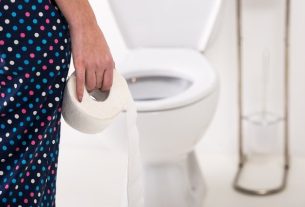Nasal decongestant is a medicine indicated to temporarily relieve the feeling of a stuffy or runny nose, which can be caused by flu, colds, rhinitis or sinusitis, for example.
This remedy works by narrowing the blood vessels in the nasal mucosa, and consequently reduces blood flow, reduces the entry of fluids into the nose, throat and sinuses, reducing inflammation and swelling of the nasal membranes and the production of mucus.
Nasal decongestants, such as pseudoephedrine or phenylephrine, can be found in the form of a nasal spray, drops, tablets or syrup, and should be used with the advice of an otorhinolaryngologist, pediatrician or general practitioner.

What is it for
Nasal decongestants are indicated for:
- Gripe;
- Cold;
- Rhinitis;
- Sinusitis or rhinosinusitis.
Nasal decongestants do not treat these conditions, but they help to temporarily relieve the symptoms of a runny or stuffy nose.
The use of nasal decongestants should be carried out with the indication and guidance of an otorhinolaryngologist, general practitioner or pediatrician, after evaluating the symptoms and diagnosing the health condition.
If you have symptoms of a runny or blocked nose, make an appointment with an otolaryngologist in the nearest region:
Taking care of your health has never been easier!
Types of nasal decongestant
The main types of nasal decongestants are:
1. Fenilefrina
Phenylephrine is a nasal decongestant available in the form of tablets, capsules, syrup or oral drops.
As it is an oral decongestant, the onset of the effect of phenylephrine is slower and presents a greater risk of side effects.
Generally, phenylephrine is associated with other substances, such as paracetamol, chlorphenamine maleate or brompheniramine maleate, for example, and can be found under the names Decongex, Stilgrip, Resphenol or Cimegripe. Find out how to take Cimegripe.
2. Pseudoefedrina
Like phenylephrine, pseudoephedrine is a nasal decongestant for oral use, found in the form of tablets or syrup.
Pseudoephedrine is usually found in combination with loratadine, desloratadine, paracetamol or triprolidine, under the names Tylenol Sinus, Desalex, Histadin D, Esalerg or Actifedrin, for example. See how to use pseudoephedrine correctly.
3. Naphazoline
Naphazoline is a nasal decongestant in the form of a nasal drop solution, applied topically inside the nostrils.
As it is applied directly to the nasal mucosa, it has a rapid onset of action but a shorter duration of action.
Naphazoline can be found under the names Narix, Neosoro, Sorine or Sinustrat, for example. Find out how to use naphazoline.
4. Oxymetazoline
Oxymetazoline, like naphazoline, is a nasal decongestant for topical use, to be applied directly to the nasal mucosa.
This decongestant can be found in the form of drops or nasal spray under the trade name Aturgyl or as a generic under the name “oxymetazoline”. Check out other medicine options to unclog your nose.
Children’s nasal decongestant
The most recommended children’s nasal decongestant by pediatricians is 0.9% sodium chloride saline solution, which can be found in the form of drops or nasal spray.
This type of nasal decongestant does not contain vasoconstrictive substances that are contraindicated for children under 6 years of age, however, 0.9% sodium chloride assists with nasal hygiene, helping to eliminate irritating substances and allergens.
Furthermore, it also contributes to fluidizing nasal secretion, relieving the feeling of a stuffy and runny nose. See how to use saline solution to clean your baby’s nose.
Some examples of saline solutions that can be used for nasal washing are Rinosoro Jet for children, Sorine for children, Nasoar for children or Maresis baby, for example.
Nasal decongestant during pregnancy
During pregnancy or breastfeeding, the use of nasal decongestants containing vasoconstrictive substances is not recommended, unless indicated by a doctor.
Therefore, before using a nasal decongestant during pregnancy, it is important to consult your obstetrician so that the most appropriate nasal spray can be recommended, which in most cases is 0.9% saline solution, such as Sorine or Neosoro, for example. example.
Homemade nasal decongestant
Some homemade nasal decongestants, such as washing your nose with saline solution, inhaling it with eucalyptus steam, or drinking ginger and garlic tea or peppermint tea, are great options for unclogging your nose.
This is because these home remedies help eliminate excess phlegm from the nose and sinuses, relieving the symptoms of rhinitis, sinusitis, flu or colds. See all the home remedy options for unblocking your nose.
Risks of using nasal decongestants
Nasal decongestant medicines can cause side effects such as nausea, vomiting, agitation, headache or dry mouth.
Furthermore, when used in the form of drops or nasal spray, they can cause irritation, a burning sensation or stinging of the nasal mucosa.
Nasal decongestants in drops or nasal sprays, when used in excess, can also cause rebound nasal congestion, which is when the nasal mucosa increases mucus production as it notices that secretion decreases, and thus, the discomfort of nasal congestion can worsen.
Other side effects of using nasal decongestants are increased blood pressure, changes in heart rhythm, tremors, dizziness, hallucinations, psychosis, seizures or even stroke.
Read too: Rebound effect: what it is, symptoms, causes (and what to do)
Who shouldn’t use
The use of nasal decongestants is contraindicated for children under 6 years of age, people who have diabetes, glaucoma, high blood pressure or heart problems.
Furthermore, nasal decongestants should also not be used by people with circulatory problems, kidney or liver disease, prostate problems or hyperthyroidism.
During pregnancy or breastfeeding, the use of nasal decongestants should only be done if indicated by the doctor, after evaluating the benefits of the treatment for the woman and possible risks for the baby.
Therefore, it is important that the use of nasal decongestants is recommended by an otorhinolaryngologist, general practitioner or pediatrician, after assessing the general health status.

Sign up for our newsletter and stay up to date with exclusive news
that can transform your routine!
Warning: Undefined array key "title" in /home/storelat/public_html/wp-content/plugins/link-whisper-premium/templates/frontend/related-posts.php on line 12
Warning: Undefined array key "title_tag" in /home/storelat/public_html/wp-content/plugins/link-whisper-premium/templates/frontend/related-posts.php on line 13



